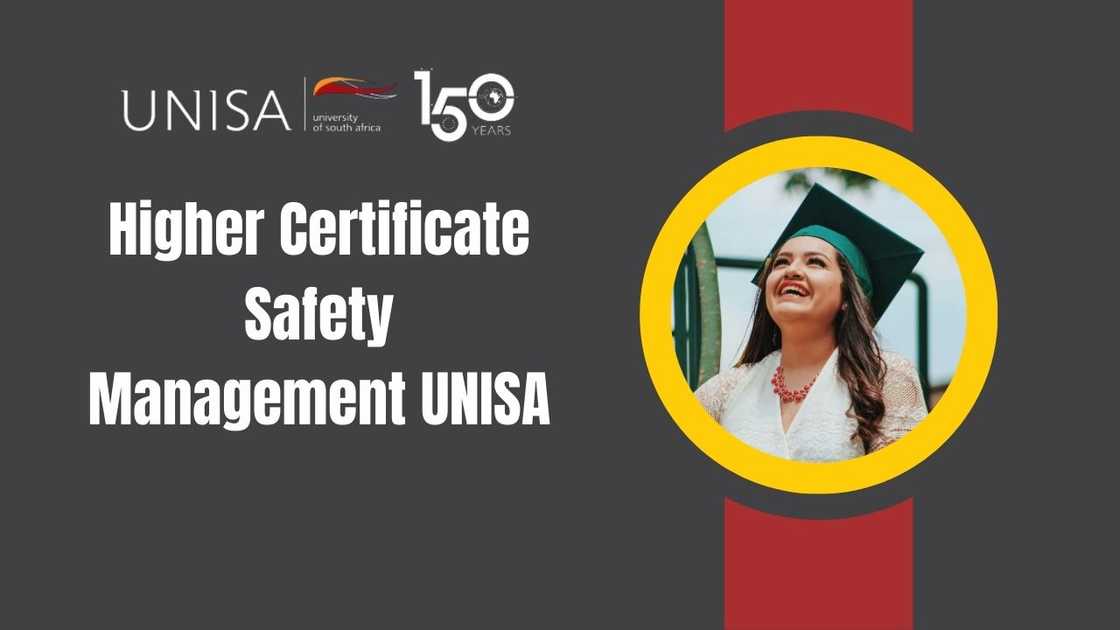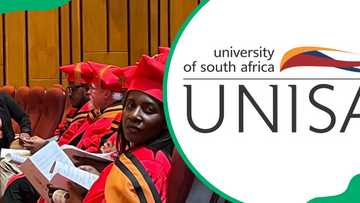Health and safety courses in UNISA 2025: exams, requirements, diploma
UNISA’s health and safety courses provide essential skills for maintaining safe workplaces. In 2025, these programs cover exams, entry requirements, and diploma options. If you're planning to pursue health and safety courses in UNISA 2025, they offer a strong foundation for a career in safety and compliance.

Source: UGC
TABLE OF CONTENTS
- Key takeaways
- Health and safety courses in UNISA 2025
- Occupational Health and Safety Law I (OHS101S)
- Occupational Health and Safety Law IIA
- Occupational Health and Safety Law III
- Higher certificate in safety management at UNISA
- UNISA occupational health and safety short courses and fees
- Safety management at UNISA
- Health and Safety courses in UNISA 2025 fees
- Bachelor's degree in safety management, UNISA
- Is there a SAMTRAC course at UNISA?
- How long does it take to study Occupational Health and Safety in South Africa?
- Which college can you study Occupational Health and Safety in South Africa?
- What is the best qualification for Occupational Health and Safety?
- What are the requirements for the Safety and Security course at UNISA?
- Which health courses does UNISA offer?
- Which courses are still available at UNISA for 2025?
- What is the best degree for health and safety?
Key takeaways
- The courses cover essential topics in occupational health and safety, including risk assessment, hazard control, and safety legislation.
- UNISA offers distance learning options, allowing students to study health and safety at their own pace.
- Admission typically requires a National Senior Certificate (NSC) or equivalent qualification, depending on the level of the course.
- Health and safety courses in UNISA 2025 are aligned with current workplace standards and future regulations.
Health and safety courses in UNISA 2025
Occupational Health and Safety is a critical field that ensures the well-being of workers by preventing workplace accidents and illnesses. UNISA offers a range of courses in this domain, from short courses to diplomas, designed for both beginners and professionals seeking to enhance their qualifications.
You may want to consider these options if you are interested in studying a health and safety management course at UNISA.
Occupational Health and Safety Law I (OHS101S)
This is a diploma programme offered at the University of South Africa. It provides students with the basics, competence, and required research skills for health and safety law.
The course also looks forward to equipping learners with the necessary legislation regarding health and safety matters. Learners are also taught about the eligibility of compensation for occupational diseases and injuries and the relevance of employment insurance.
The course prepares learners on how to effectively execute their roles as managers and supervisors in charge of safety, both in the scientific aspect and on a professional basis.
Professionally, the programme targets teaching aspirant managers, supervisors, shop stewards, safety managers, occupational hygienists and training officials.
Requirements for the Occupational Health and Safety course at UNISA (Law I)
For you to be admitted to this course, you are required to have attained the following requirements:
- Own a National Senior Certificate. If you do not have the certificate, you are required to have at least attained the equivalent qualification.
This course lasts twelve months. Students are required to take formative assessment tests and assignments to ensure they attain their certificate. A score of at least 50% is the minimum qualification for a certificate. This programme is offered at NFQ level 5. English is the official language for teaching.
Occupational Health and Safety Law IIA
This is the second level in the chain of Occupational Health and Safety at UNISA. It is offered at the diploma level under the sixth level of the NQF.
The purpose of the course is the same as that of Occupational Health and Safety Law I. The one thing that makes this level an added advantage is that it offers a distance learning option.
To graduate from this course, students must pass all the modules. The university advises learners to pick the number of modules they are sure they can handle.
Occupational Health and Safety Law III
This is the third option in the list of UNISA short courses on health and safety. Teaching is delivered in English. It is offered under the NQF level 6.
Higher certificate in safety management at UNISA

Source: UGC
The Higher Certificate in Safety Management is a cost-effective, entry-level qualification ideal for those aiming for roles in safety oversight or compliance. It offers flexibility, practical training, and recognised certification.
Higher Certificate in Safety Management UNISA requirements
Here are the entry requirements for the Higher Certificate in Safety Management (Programme in Safety Management, code 72435) at UNISA:
- Matric certificate (National Senior Certificate) – Pass only
- You may qualify based on relevant work experience or prior learning.
- You’ll need to submit a CV and an employer reference letter.
Higher Certificate in Safety Management UNISA modules
Here are the modules for the Higher Certificate in Safety Management (Programme in Safety Management, code 72435) at UNISA:
- PSMP015 – Introduction to Safety Management
- PSMP026 – Assess Safety Risk
- PSMP038 – Manage Safety in the Workplace
- PSMP049 – Analyse Safety Incidents
Higher Certificate in Safety Management UNISA fees
Here’s the latest info on fees for the Higher Certificate in Safety Management (Programme in Safety Management, code 72435) at UNISA:
Fee Component | Amount | Notes |
Base programme fee | R7200 | Covers all modules, materials, and exams |
Foreign student levy | R1500 per module | Applies to non-resident students |
Application fee | R140 | One-time for new students number |
UNISA occupational health and safety short courses and fees
Here’s an enhanced overview of relevant UNISA short courses in Occupational Health and Safety (OHS):
- Programme in Safety Management (Code 72435)
- Programme in Advanced Safety Management (Code 76914)
- Short Course in the Occupational Health and Safety Act (Code 01724)
Course | Duration | Entry Requirement | Fee (ZAR) |
OHS Act Short Course (01724) | 6 months | Senior Certificate (NQF 4) | Quote-based |
Safety Management Certificate (72435) | 12 months | Matric or RPL | 7,200 |
Advanced Safety Management (76914) | 12 months | NSC or 3 yrs OHS experience + 72435 | 8,000 |
Safety management at UNISA
This is a safety officer course at UNISA offered at the National Diploma level, NQF level 6. The purpose of the programme is to groom learners who will be able to run safety management programmes in big enterprises.
National Diploma in Occupational Health and Safety courses at UNISA
This UNISA Safety Management course is offered at NQF level 6. The university has stipulated a set of requirements that learners should fulfil for them to be admitted into the programme. These health and safety courses in UNISA 2025 requirements include:
- A National Senior Certificate or any other equivalent higher certificate. A learner could also use their diploma endorsement if it meets the following demands: a score of not less than 40% in Mathematics, a score of not less than 50% in the language that was used during learning and not less than 60% in Mathematics literacy.
- If a learner is going to rely on their National Senior Certificate, the certificate should meet the following requirements: a score of not less than 40% in Mathematics and a score of not less than 50% in the preferred language of teaching.
- Learners could also rely on their level 4 National Senior Certificate. However, they are required to meet the following requirements: hold a diploma endorsement, have a score of not less than 40% in Mathematics, not less than 60% in Mathematics literacy, and not less than 60% in the preferred language of learning.
Health and Safety courses in UNISA 2025 fees
Here’s an overview of health & safety–related courses at UNISA in 2025 and their fees:
Course type | Fees estimated |
Short Safety Management SLP | R6,000 total |
Diploma / Adv Diploma Modules | ~R2,000 per module (fee estimator tool) |
PGDip in Safety Management | Application: R140 + module fees |
Foreign Student Levy | ≈R1,500 extra per module |
Bachelor's degree in safety management, UNISA
UNISA doesn’t offer a straight “Bachelor's in Safety Management.” Instead, learners progress from the diploma into higher-level qualifications. Here’s a detailed overview of UNISA’s undergraduate pathways in Safety Management, including bachelor-level options:
- 1. Advanced Diploma in Safety Management (NQF 7, 120 credits — code 90181)
- Baccalaureus Technologiae: Safety Management (BTSMN) (NQF 7)
Is there a SAMTRAC course at UNISA?
UNISA offers various short courses in safety management, including SAMTRAC (Safety Management Training and Resource Centre) accredited programs. The fees for these courses vary depending on the duration and content.
How long does it take to study Occupational Health and Safety in South Africa?
The duration of OHS studies varies according to the qualification level:
- Short courses often last six months to a year
- Higher certificates last two years
- Diplomas last two to three years
- Bachelor's degrees last four years
Which college can you study Occupational Health and Safety in South Africa?
While UNISA is a prominent institution offering OHS courses, other colleges and universities across South Africa provide similar programs. Some popular options include:
- Cape Peninsula University of Technology (CPUT)
- Durban University of Technology (DUT)
- Technikons and FET colleges
What is the best qualification for Occupational Health and Safety?
The best qualification for Occupational Health and Safety depends on your career goals:
- Certificate: This is suitable for entry-level OHS roles.
- Higher certificate: It provides a solid foundation for safety officers and supervisors.
- Diploma: Prepares individuals for managerial positions in OHS.
- SAMTRAC certification: Recommended for professionals seeking international recognition and advanced knowledge in safety management.
What are the requirements for the Safety and Security course at UNISA?
Here are the admission requirements for UNISA’s Safety and Security offerings in 2025:
- A Senior Certificate or equivalent NQF 4 qualification
- Successful completion of the Course in Security Practice (72486)
- National Senior Certificate (NSC) with diploma endorsement and ≥50% in the language of instruction
- A completed Diploma in Security Management (NQF 6)
- An appropriate NQF 7 qualification with at least 60% in the major
Which health courses does UNISA offer?
UNISA’s Health Sciences portfolio for 2025 spans a wide range of undergraduate, postgraduate, research, and short learning programmes:
- Bachelor of Nursing Science (BNurs / BNSc)
- Bachelor of Social Science in Occupational Health (BSc Occ Health)
- Bachelor of Environmental Health (BEnvH)
- Bachelor of Science in Occupational Health and Safety (BSc OHS)
- Bachelor of Social Science in Health Studies (BSocSci)
- Bachelor of Health Science (BHSc)
- Master of Public Health (MPH)
- Postgraduate Diploma in Public Health
- Doctor of Philosophy in Public Health (PhD)
Which courses are still available at UNISA for 2025?

Source: UGC
- Undergraduate, Honours & Postgraduate Diplomas (Incl. CTA)
- Master’s & Doctoral Qualifications
- Short Learning Programmes (SLPs / Short Courses)
What is the best degree for health and safety?
The best degree for a career in Health and Safety depends on your goals, but generally, the Bachelor of Science in Occupational Health and Safety (BSc OHS) is considered the most direct and specialised path.
Whether you're starting your career or enhancing your current skills, health and safety courses in UNISA 2025 offer a practical and accredited pathway. With clear requirements and a focus on real-world application, these courses prepare students for success in today’s safety-conscious work environments.
Briefly.co.za recently published a list of higher certificate courses at UNISA and their requirements. Higher certificates, like other post-matric studies, equip students with the skills needed for a particular career. They are also a stepping stone to preferred higher education studies, and students no longer need to repeat matric to gain entry.
Qualifications also come in handy for qualified students who miss out on university registration. You can enrol for a higher certificate instead of waiting for the next application window or taking a different course.
Source: Briefly News

Priscillah Mueni (Lifestyle writer) Priscillah Mueni is a lifestyle and entertainment content creator with more than 4 years of experience. She graduated from Meru University of Science and Technology with a Bachelor of Technology in Civil Engineering in 2019. In 2023, Priscillah finished the AFP course on Digital Investigation Techniques. She has been writing articles on Briefly.co.za since 2019. Email: pshmueni@gmail.com

Adrianna Simwa (Lifestyle writer) Adrianna Simwa is a content writer at Briefly.co.za, where she has worked since mid-2022. She has written for many periodicals on a variety of subjects, including news, celebrities, and lifestyle, for more than three years. She has worked for The Hoth, The Standard Group and Triple P Media. Adrianna graduated from Nairobi University with a Bachelor of Fine Arts (BFA) in 2020. In 2023, Adrianna finished the AFP course on Digital Investigation Techniques. You can reach her through her email: adriannasimwa@gmail.com









